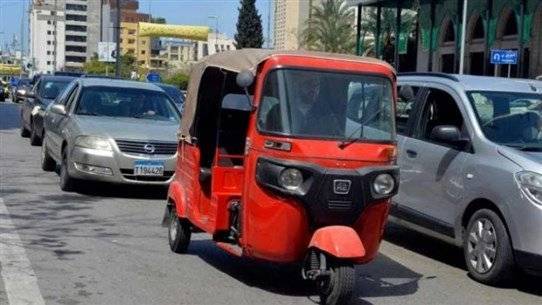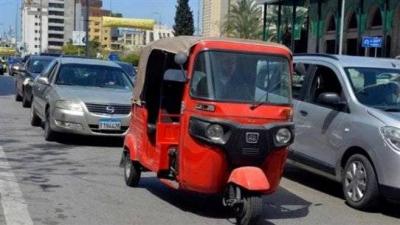Chaos is sweeping through the economy in times of collapse, further enhancing it. Traditional interests, especially small individual ones, are "withering," giving rise to new interests that do not provide significant added value to the economy. Among these interests is the mode of transport known as the "tuk-tuk," which, due to the absence of state regulation, exacerbates the already troubled economy by diminishing real production. One might think they are walking in the slums of Mumbai, India, or Kabul, Iraq, or even in the Duweika district of Egypt, when strolling through various Lebanese areas, particularly in some villages in Baalbek and Akkar. The common theme among these impoverished areas is the transformation of the tuk-tuk from an individual means of transport (a motorcycle) into a profession in its own right.
The rise in gasoline prices, the decrease in job opportunities in agriculture, construction, and car repair, and the significant increase in rental prices have led drivers of taxis, construction workers, farmers, traders, and craftsmen to invest in buying tuk-tuks, which cost about $3,000, to secure daily livelihoods. Thus, this Indian-origin vehicle has transformed into a taxi, a mobile grocery store, a delivery service, a café, a restaurant, and even a tow truck for disabled vehicles... the list of innovations forced by harsh realities continues to grow.
Exploiting the Chaos
The "tuk-tuk investors," whether they are importing companies or individuals who see this means of transport as their salvation from the hell of poverty, cannot be blamed. As Aristotle said, "nature abhors a vacuum." If legitimate productive institutions do not fill this gap, the shadow economy will take over with temporary professions that risk becoming permanent due to the continued weakness of the state and a covert intention to dismantle the legitimate economy.
"There are those who benefit from the crisis and its evolution to continue the destruction of the country, preventing the establishment of an organized and legitimate public transportation system," according to transportation researcher Shauqi Hatoum. "This leads to achieving their goals by dismantling the rule of law and institutions to build their own state on its ruins."
The Need has Emerged
Often, the tuk-tuk phenomenon accompanies the precariousness of economies rather than their advancement. After having no significant presence in Lebanon before 2019, its number has now surged to thousands. As the economic crisis deepens further, with the GDP dropping to below $20 billion and the purchasing power of salaries and wages in Lebanese pounds collapsing, its usage is expected to increase even more. Citizens who can no longer afford the costs of commuting in private cars will rely on tuk-tuks, especially in the absence of public transport. While a car consumes a tank of gasoline worth 623,000 Lebanese pounds for every 150 kilometers it travels, the tuk-tuk can travel 700 kilometers with just 20 liters. "This has led to a spike in demand," according to the head of the Lebanese Merchants' and Entrepreneurs’ Association, Nicola Abou Khater.
Furthermore, it accommodates three passengers while the average number of passengers per car in Lebanon is 1.5. This has prompted families to flock to tuk-tuks to reach work, drop their kids at school, go shopping, etc., all functions for which citizens can no longer use cars.
Tuk-Tuk Uses
The use of tuk-tuks in Lebanon, as in other countries where they are prevalent, has extended beyond transportation to a means of income generation amidst rising unemployment and shrinking job opportunities, which, according to Abou Khater, has helped many families survive under these difficult circumstances. The increase in demand has also led to the establishment of an "assembly line" employing dozens of workers to assemble these vehicles, which come to Lebanon disassembled. Abou Khater points out that "tuk-tuks are not the only mode of transportation gaining popularity in Lebanon due to rising fuel prices and maintenance costs; electric scooters and bikes are also in demand. With new car sales plummeting by more than 90%, the need for practical alternatives has emerged, making these modes a lifeline for many individuals and institutions."
Lack of Classification for Tuk-Tuks
The lack of regulation in the sector starts from the absence of a classification for tuk-tuks in Lebanon. According to Ayman Abdel Ghafour, head of the Vehicle Registration Department, it is registered as a motorcycle. "This makes it difficult to accurately measure the actual number of these vehicles. While semi-confirmed information indicates that between 700 and 800 tuk-tuks have been officially registered since 2020, the actual number on the streets may exceed this number several times. Many citizens using this vehicle in villages and rural areas do not see the need for legalization and registration, first due to not knowing it is subject to registration as it is regarded as a motorcycle that requires tax payments, and secondly due to usage being limited to internal neighborhoods in villages and rural areas and not running on public roads." On the other hand, Abdel Ghafour notes that "many vehicles similar to tuk-tuks with engines under 1000 watts do not require registration, although their number remains small. He emphasizes the need to amend the laws so that tuk-tuks are classified as a distinct category from motorcycles, defining their functions accurately. This was not addressed in the basic legislative text issued in 2012, when the tuk-tuk phenomenon had yet to spread in Lebanon. Once this is done, it will be easier to regulate this class of vehicles and enforce compliance."
Misuse of Tuk-Tuks
The second issue lies in the misuse of tuk-tuks, where four people sit in addition to the driver, endangering public safety by over 90%, according to Hatoum. "Additionally, their replacement of taxis has caused the price of taxi permits to drop from $35,000 to $5,000, adding a new issue to a sector already suffering from organized and legalized fraud."
The Alternative Exists... But!
The alternative to tuk-tuks would involve the presence of an organized public transportation system, not limited to major cities but extending to rural areas, including remote regions," according to Hatoum. "Buses and mini-buses, which are widely distributed in all areas, can be utilized in this plan, costing between $500 million and $2 billion at most, saving citizens the huge amounts they spend on transportation and easing the state’s budget burdens. Especially as public sector employees refuse to accept a daily transportation allowance of 95,000 Lebanese pounds, demanding it be raised to over 200,000 or replaced with fuel vouchers, a burden the state cannot bear.
The frequent discussions about a productive economy since 2019, as an alternative to the prevailing rentier economy, have overloaded the country with ideas that have reached a point where people call for agriculture on balconies and terraces. After nearly three years of an unrestrained crisis with no remedies, the outcome is the birth of a "tuk-tuk economy." Its danger lies in its focus on ensuring daily survival rather than steering the economy more towards "micro-small" businesses at the expense of real production.




